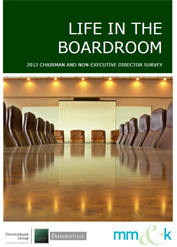How do you make a board effective and should chairmen be paid more? Discussion on boardroom dynamics at the High Pay Centre event on April 29
 Are chairmen underpaid compared to chief executives? Cliff Weight, director of remuneration consultants, MM&K, suggested that chairmen were good value since they are paid only 9 per cent of the median package for a FTSE 100 CEO. Still at £350,000 that’s 10 times more than the average employee in our top companies.
Are chairmen underpaid compared to chief executives? Cliff Weight, director of remuneration consultants, MM&K, suggested that chairmen were good value since they are paid only 9 per cent of the median package for a FTSE 100 CEO. Still at £350,000 that’s 10 times more than the average employee in our top companies.
The role has become a more prominent one and chairmen who used to take it on for the honour, are now demanding more money. Their pay has gone up, but largely because CEOs have had such big increases in recent years and pulled pay for the rest of the board up behind them.
The highest-paid chairman in the FTSE 100 is John Peace at Standard Chartered bank who took home £1.1m last year, he was followed by Marcus Agius at Barclays on £750,000 who has now left and Philip Hampton at RBS. Carl-Henric Svanberg at BP also earned £750,000 – all four of these top chairmen have had to deal with huge reputational issues in the past couple of years, probably occupying more than the average 50 days a year spent by the chairs of big companies on their jobs.
Chairs are seldom remunerated in shares and few hold stakes in the companies over which they preside. This is something that is beginning to change, but runs up against the corporate governance code’s test of independence.
While one of the chairman’s most important roles is to be able to ask the CEO to leave and to lead the search for a successor, they rank succession planning low in their list of priorities. In the MM&K/Directorbank survey of chairs and non-execs, remuneration and succession planning were given the lowest priority with strategy given the highest.
Ken Brotherston, executive chairman of Directorbank, said the dynamic between chairman and CEO was most important in the effectiveness of a board. A very strong CEO can deter non-execs from challenging him or her.
In the survey of attitudes in the boardroom, a majority of non-execs agreed (slightly worryingly) that “winning is more important than ethics.” However, they also felt that non-execs should influence morality in the boardroom.
Some of the non-execs in the audience stressed the need to dig deep into the company, to meet people that are not on the board and to visit plants and factories un-supervised. They also highlighted the need for board information to be presented in an accessible way.
Theresa Wallis, who is chairman of Lidco, that makes cardiac sensors, pointed to the difference between large, FTSE 100 firms and smaller companies where non-execs are much more hands-on. “Boards really work well when they are all pulling together,” she said.
Although when a company is on a roll, it is extremely difficult for a non-exec to challenge it. The RBS board, for example, was unanimously behind the ABN Amro takeover.